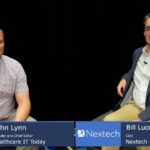The following is a guest article by Dr. Musheer Ahmed, Founder and CEO at Codoxo
New Generative AI Use Cases are Emerging, Including to Transform Healthcare Payments, it’s up to the Industry to Embrace Adoption for Next-Level Cost Containment Outcomes
The healthcare system in America is confronted with significant challenges, including a steep rise in healthcare expenditures. In 2023, healthcare costs are projected to surge by almost 6%. A vast majority of healthcare workers are reporting job burnout. While these and other obstacles may seem insurmountable, we are already seeing how advancements in technology — particularly with artificial intelligence (AI) — can turn the tide.
Healthcare organizations are investing in transformational technologies to make healthcare more affordable and effective. AI is among them, and it’s evolving at a supersonic speed. With generative AI use cases on the rise across the healthcare landscape, this turbocharged form of AI is now poised to automate untouched terrain in the realm of payment integrity, starting with the automation of highly complex healthcare claim audits.
But innovation alone doesn’t go far enough. Industry stakeholders must come together to spur the adoption of new generative AI applications when the benefits of doing so are clear and urgent.
Healthcare Pain Points Require New Approaches
One of the greatest challenges the healthcare industry faces is the enormous administrative workload that goes along with managing claims, and this load falls heavily on the clinicians who are providing care. A 2022 Deloitte survey of U.S. frontline physicians found that 81% of respondents report burnout, with contributing factors being unnecessary or low-value tasks that divert their attention away from patient care.
Automation can address that very issue, offloading much of the clerical tasks that bogs down clinicians so they are able to focus on higher-value work. In fact, studies by the U.S. government and leading medical associations call upon stakeholders to do their part. Healthcare technology companies are urged to design interoperable data platforms that offer holistic data access and transparency to better meet the needs of health workers, care teams, and patients across the continuum of care. Likewise, healthcare payers need to invest in technology that automates non-clinical work, giving precious time back to workers by reducing or eliminating low-value activities.
Another challenge posed by the complexity of the data is the imbalance between the time and resources allocated to claims and the return on investment (ROI). Currently, in-patient and facility claims (such as extended hospital stays) account for a significant portion of costs in healthcare — as high as 45%. Yet due to their complex nature, health payers, third-party administrators, government agencies, and pharmacy benefits managers focus most of their constrained resources on auditing professional claims.
In other words, nearly half of all U.S. healthcare spending goes unaudited today. Even worse, up to 10% of this spending is rife with waste, abuse, and fraud.
How Generative AI Can Help
Generative AI goes where no other AI has gone before. Its sophisticated algorithms and dynamic user engagement drive radical levels of data analytics consumption and decisive follow-up for an infinite number of use cases, many still undiscovered. It makes large quantities of data and input analysis accessible to non-technical people, making it consumable, understandable, and actionable.
For health payers and agencies, AI so far has been mostly applied to claims processing, member engagement, and identification of suspected cases of fraud, waste, and abuse. These are just the starting points. Generative AI enables a seismic “shift left” for payment integrity and SIU teams intent on stopping erroneous or fraudulent payments before they start. It can drive cost savings estimated upwards of $60-$70 per member per year across an organization’s entire cost containment journey.
Equally as impressive, generative AI frees clinicians and administrators to spend their valuable time caring for patients instead of reviewing lengthy in-patient and hospital claim audits. Automation of these complex audits drives exponential process efficiencies and outcomes. It can speed turnaround times from 15 days (on average) to less than 24 hours; increase completed audits per day from 2.5 (on average) to more than 20; and eliminate dollar thresholds that restrict claims analysis to higher dollar ranges.
These are just a few examples of how generative AI empowers the industry’s most valuable asset – its people – to operate at the top of their licenses while reducing the cost of care.
Stakeholders Working Together
Given the rising costs of care and growing demand for better patient and workforce experiences, healthcare leaders have little choice but to consider generative AI as a critical investment area. Early investments are proving fruitful – enough to convince McKinsey to forecast the possibility of generative AI delivering $1 trillion in estimated market value into our health system.
How can technology companies catalyze the transformation of American healthcare? By pairing innovation with education to accelerate adoption.
Every healthcare organization is at a different stage of AI maturity. Strategic advancement of AI takes incremental steps. As a technology provider specializing in healthcare AI, we strive to inform and inspire action in a variety of ways, from publishing AI trend reports to building a new online community called AI for PI for payment integrity professionals to network, share insights, and deepen their knowledge of artificial intelligence.
Making healthcare more affordable and effective is within reach, but it hinges on the ability of all stakeholders to work together in partnership. As technology providers step up their role as educators, so too must healthcare organizations – by serving as curious students who explore, test, and adopt new methods that measurably help achieve their missions.
 About Dr. Musheer Ahmed
About Dr. Musheer Ahmed
Dr. Ahmed is the CEO and Founder of Codoxo. He founded Codoxo (formerly named FraudScope) to help make our healthcare system more affordable and effective. Codoxo’s Forensic AI Platform uses patented technology to identify problems and suspicious behavior earlier than traditional techniques, which helps ensure our scarce healthcare dollars go to real patient care. When he’s not fighting healthcare fraud, you’ll find him volunteering for various causes and spending time with his family.













